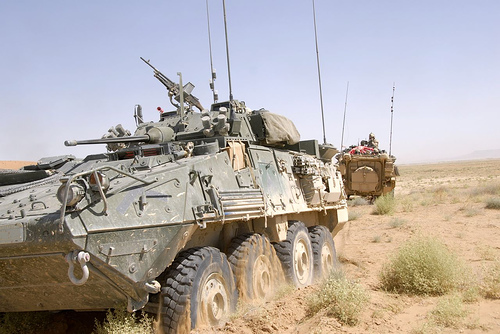
Feb 21, 2014, Canadian Dimension
The biggest manufacturing export deal in Canadian history, announced last week, will supply military hardware to one of the most repressive regimes in the world.
It’s been dismaying, although not too surprising, to see the lack of debate about the $10 billion agreement which will see London, Ontario based General Dynamics produce a fleet of armoured vehicles for Saudi Arabia. Actually, to say there’s been a lack of debate is an understatement. One week after the agreement was announced, there has not yet been a single editorial critical of this deal in a major media outlet in Canada. This silence needs to be broken.
The federal government’s Trade Minister, Ed Fast, presented the deal as a triumph of diplomacy. The Conservatives have downgraded talk of human rights and aid in favour of more explicit economic focus to foreign policy matters, a posture they have branded as their Global Markets Action Plan. As Fast explained, “Our government will continue to support our exporters and manufacturers to create jobs, as part of our government’s most ambitious pro-trade, pro-export plan in Canadian history.”
The government claims the export deal will mean 3,000 jobs per year, with overall economic benefits spread out over 500 Canadian businesses. (Military-industrial production and supply chains, as we saw with the F-35 plans, are typically spread over many regions and companies.)
Notably, the agreement between General Dynamics, a U.S.-based multinational arms producer, and Saudi Arabia is being underwritten by the feds’ Canadian Commercial Corporation.
When Caterpillar shuttered its London, Ontario plant in 2012 in an unsubtle act of union-busting, Harper’s government threw up its hands and did nothing. Same with the more recent case of Heinz closing its plant in Leamington, Ontario. But the Saudi deal confirms that the Conservatives, for all their “free market” ideology, do believe in industrial strategy and government intervention in the economy – at least when military hardware and arms, or bitumen, are involved.
Official Opposition NDP Foreign Affairs critic Paul Dewar expressed concerns about the Saudi deal, as reported in The Globe and Mail, “Is this just open-for-business for whomever wants to buy arms from us? I am concerned what these arms could be used for.”
It’s a very valid concern. Back in March 2011, Saudi forces including armoured vehicles (LAV-3s) supplied by General Dynamics rolled into the small Gulf state of Bahrain to crush that country’s democracy movement. As the Ottawa Citizen reported in 2012:
“Video and photos shot by protesters and media outlets in March 2011 showed Saudi troops using LAV-3s to suppress an uprising inspired by events in Egypt, Tunisia and Libya and opposed to Bahrain’s ruling Khalifa family.”
“More than 30 protesters were killed, hundreds wounded and nearly 3,000 arrested in the joint Saudi-Bahraini crackdown, which was largely ignored by Canada and other Western states because of Bahrain’s strategic relationship with the U.S.”
The Harper government’s real Global Action Plan, it indeed seems, is to sell pretty much anything to anyone. Compare this posture to the rhetoric of “ethical oil” which the government deployed in tandem with far right-wing boosters of the Alberta tar sands. The claim was that expansion of the tar sands was “ethical” since the alternative was to continue importing oil from places like Saudi Arabia.
There are layers of bad faith and hypocrisy to peel back from this line or argument, but let’s stick to the most obvious: by this Conservative logic it’s unethical to purchase oil from Saudi Arabia because they’re a repressive government, but it’s ethical and praiseworthy to sell Saudi Arabia the very means of repression.
The deal with Saudi Arabia comes following a year in which Foreign Minister John Baird frequently met with top officials throughout the Gulf states. Last spring, Baird took a trip that included stops in Jordan, Qatar, Bahrain and the UAE – where, of course, he held a photo-op at the local Tim Horton’s.
A press statement about the tour blandly and falsely proclaimed, “In visits to Qatar and Bahrain, the link between peace and prosperity will be explored in detail – to the benefit of those in the region and beyond.”
It’s not just this massive arms deal which deserves more scrutiny, but the entire Harper government foreign policy stance toward the Saudis and other Gulf petro-dictatorships. While the Harper government’s uniquely over-the-top alliance with the Israeli government of Benjamin Netanyahu has drawn widespread attention, the increasingly close ties with the Gulf dictatorships has gone almost unnoticed.
We need to explore in much more detail the links between prosperity for corporations and war and repression in places like Bahrain and Saudi Arabia. A good start would be a vigorous debate, both in the media and in Parliament, about the largest export manufacturing deal in Canadian history.
 Syria Support Movement solidarity with the Syrian people
Syria Support Movement solidarity with the Syrian people




